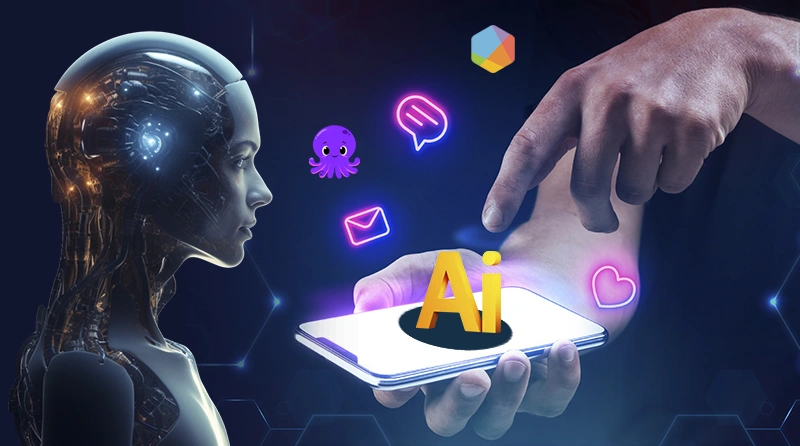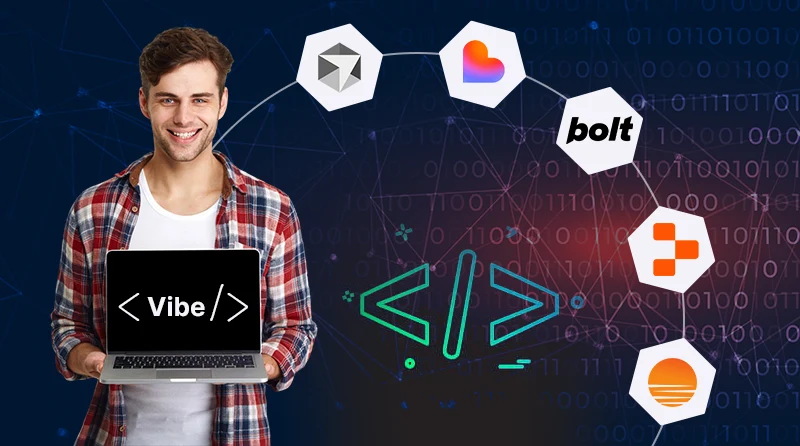Top 20 Free AI Tools for Social Media in 2026

Do you ever feel like keeping up with social media trends is a full-time job, and you wonder what it would be like if you had a super-smart assistant to help you conquer it all?
Well, that’s what today’s AI tools for social media are offering to creators, brands, and marketers. With social media being such a central part of our lives, over five billion people use social media globally, and the number is expected to hit 6 billion by 2028.
Whether you’re trying to build your presence or scale it, AI-powered social media tools will simplify your workflow, expand your reach, and make every post impactful.
On top of that, nearly 19.65% of marketers plan to use AI agents to automate marketing in 2025. From writing captions to scheduling posts for social platforms and generating visuals to tracking performance, artificial intelligence will transform how content is created and managed.
But it’s not just about saving time. It’s about making smarter decisions, understanding what your audience wants, and creating content that truly connects.
So, if you are ready to explore AI tools for social media, which can help you do more with less. This blog will guide you through how these tools work, what benefits they bring, and which ones are worth your attention in 2026.
6 Benefits of Using AI Tools for Social Media Marketing
Social media AI tools can level up your marketing game. They’re designed to simplify your workflow, save you time, and help you stay consistent.
Let’s explore some of the benefits of using social media marketing tools.
1. Time saver
One of the biggest advantages of using AI tools for social media marketing is that they automate repetitive tasks such as content scheduling and basic analytics. For instance, instead of spending hours, you can generate an entire week’s worth of posts in just minutes so your team can focus on strategic and creative work.
2. Content creation
AI-powered social media tools are a game-changer for maintaining consistency without risking creative burnout. They’re great for generating ideas, drafting captions, and creating engaging visuals that align with your brand’s identity.
3. Data-driven decisions
With AI tools for social media analytics, you can get deeper insights into what your audience wants. These tools can analyze a vast amount of data to show you the best times to post, what content performs well, and how your audience interacts with your brand.
4. Audience Targeting and Segmentation
AI algorithms can identify and target specific demographics more effectively so that the content reaches the right audience at the right time. For instance, an e-commerce platform can use social media AI tools to segment users based on their shopping habits, enabling more personalized content delivery.
5. Scalability
As your business grows, so does your social media workload. AI tools for social media marketing help you scale your efforts without necessarily scaling your team, making growth without any roadblocks.
6. Competitive edge
When you use these advanced AI tools for social media content creation and analytics, it gives you an edge over your competitors who might still be relying on manual methods. And you can scale up faster than those who are still figuring out methodologies and strategies.
10 Best AI Tools for Social Media
Are you still manually optimizing every post or having brain rot after juggling several ideas? Don’t worry, we have hand-picked the 10 best social media AI tools, which will help you take the load off.
Take a quick look at the table.
| Tool Name | Key Features | Starting Price |
|---|---|---|
| Buffer | Post scheduling, AI assistant, engagement tracking, analytics dashboard |
|
| Hootsuite | AI content ideas, scheduling, performance insights, smart caption generator |
|
| Later | AI caption writer, link-in-bio tool, visual planner, Instagram tools |
|
| SocialBee | AI assistant for captions, category-based scheduling, and analytics |
|
| Sprout Social | Smart social inbox, content calendar, advanced reporting, AI suggestions |
|
| Magic Studio (Canva) | AI design tools, video editing, social templates, and background remover |
|
| Predis.ai | AI post generator, competitor analysis, and content ideas |
|
| Lumen5 | AI-powered video creation, templates, and auto-captioning |
|
| Synthesia | AI video avatars, voiceovers, script-to-video in minutes |
|
| DALL·E | AI image generation from text prompts, ideal for creatives |
|
20 Best Marketing Tools For Social Media
Social media is a place where your brand grows, connects, and converts. With the right set of AI tools for social media, you can schedule posts, track performance, and engage with your audience. And you can build a strong social presence across various channels.
If you are planning to achieve this, then explore the best marketing tools for social media:
1. Buffer

Buffer is one of the classic social media AI tools available in the market for several reasons. It’s easy to use and has a clean interface & focuses on what matters the most, like scheduling, publishing, and tracking social media performance without any fluff.
Features of Buffer:
- Multi-platform scheduling feature for Facebook, Instagram, LinkedIn, X, or Pinterest
- Visual calendar to plan and preview posts
- Analytics dashboard with engagement and reach insights
- Direct integration with Canva and WordPress
Use Cases:
- Digital marketing service providers use it for planning and scheduling posts in advance.
- Team-based content management makes it easier for small teams to collaborate on social media strategy and execution.
- Shortening and tracking links by using buff.ly to track click-through rates on shared links.
Let’s talk about its Pros and Cons:
| Pros | Cons |
|---|---|
| User-friendly and intuitive interface | Limited analytics on lower plans |
| Ideal for individuals and small teams | No built-in social inbox for direct replies |
| Affordable pricing with a generous free plan | Fewer advanced automation features compared to others |
2. Hootsuite

Hootsuite is built for businesses that take social seriously. With deep analytics, multi-platform scheduling, and powerful team collaboration tools, it is among the best AI tools for creating social media posts. It’s ideal for agencies, marketing departments, and brands managing multiple social media accounts at scale.
Features of Hootsuite:
- Unified social inbox to manage messages, comments, and mentions in one place.
- Advanced analytics reports to track engagement, growth, and ROI
- Team access and approvals with roles and permissions
- Integration with Trello, Canva, Salesforce, and 150+ apps.
Use Cases:
- Best if you are running large-scale, multi-platform social campaigns
- Brand monitoring and reputation management, as it tracks brand mentions and engages in relevant conversations
- In-depth social media analytics for analyzing performance data to optimize strategies and measure ROI
Let’s talk about its Pros and Cons:
| Pros | Cons |
|---|---|
| Good for managing multiple brands | Paid plans can get pricey |
| Built-in team collaboration | UI feels a bit outdated |
| Strong analytics and reporting | Overkill for freelancers |
3. Later

Later stands out with its visual-first approach, making it a favourite among Instagram marketers, content creators, and brands that rely on aesthetic consistency. It’s designed for planning, previewing, and scheduling posts with ease, especially image and video-heavy content.
Features of Later:
- It has a drag-and-drop visual content calendar feature
- Instagram-first scheduling with auto-publishing for posts, stories, and reels
- It has a media library with tagging, organization, and reusability
- Linkin.bio tool to create a clickable, shoppable Instagram link
Use Cases:
- Marketers use it for planning and previewing Instagram content ahead of time
- Organizing and reusing visual assets across platforms
- Used for managing short-form video publishing for TikTok and Reels
Let’s talk about its Pros and Cons:
| Pros | Cons |
|---|---|
| Perfect for visual brands and influencers | Limited analytics on lower tiers |
| Easy-to-use media library and calendar | Some features are restricted to Instagram |
| Affordable and beginner-friendly | Not ideal for text-heavy or B2B strategies |
4. SocialBee

SocialBee is all about content efficiency; it is the best among all AI tools for social media content creation. It helps you organize, repurpose, and schedule posts through category-based automation. If you are a solopreneur, a coach, or a small business struggling to stay consistent without consistently creating, then this is the best social media management tool for you.
Features of SocialBee:
- Businesses use it for content categorization.
- Import content in bulk via CSV or integrations
- Create multiple variations of the same post to avoid repetitive content
- Built-in analytics and UTM tracking
Use Cases:
- Used for managing recurring content like quotes, blogs, and promotions
- Coaches, digital marketing agencies in the USA, or freelancers use it for social media automation
- Grouping and rotating content types by theme or goal
Let’s talk about its Pros and Cons:
| Pros | Cons |
|---|---|
| Excellent for evergreen content recycling | The interface isn’t as polished as the competitors ‘ |
| Affordable for small businesses and creators | Slight learning curve with category setup |
| Includes AI writing and post variants | Advanced analytics is limited on lower plans |
5. Sprout Social

Sprout Social combines professional-grade features with a sleek, intuitive interface. It is built for marketing teams, agencies, and enterprises that need detailed insights, smooth workflows, and deeper customer engagement across platforms.
Features of Sprout Social:
- It has a smart inbox that manages all your social media interactions in one place
- Schedule posts across various platforms with optimal send-time recommendations
- Packed with comprehensive reporting and analytics tools
- Manage customer relationships and interactions within the platform
Use Cases:
- Enterprises use it for social media management as it can handle complex social strategies and large teams
- Businesses use it for managing and responding to customer inquiries and feedback across social channels
- Manage multiple brands, clients, or departments
Let’s talk about its Pros and Cons:
| Pros | Cons |
|---|---|
| Enterprise-ready tools with team collaboration features | Higher price point than most tools |
| Excellent UI with powerful analytics | No free plan available |
| Social listening and CRM integration included | Overkill for smaller teams or individuals |
6. Magic Studio (Canva)

Magic Studio is Canva’s suite of AI-powered tools that bring design and content creation to a whole new level. It is one of the top AI tools for social media content creation that helps you create eye-catching visuals and generates text for your posts. Therefore, if you want to create visuals for social media, then Canva is for you.
Features of Magic Studio (Canva):
- It has an AI-powered design tool that helps in text-to-image generation.
- User-friendly drag-and-drop interface with a large library of customizable templates.
- Brand kits for logos, colors, and fonts with real-time collaboration with the team.
- Animation, video editing, and integrations feature.
Use Cases:
- The marketing team uses it for creating visual designs for social media posts.
- Marketers use it for developing presentations for meetings and webinars.
- Designers use it for designing unique logos and business cards.
Let’s talk about its Pros and Cons:
| Pros | Cons |
|---|---|
| User-friendly friendly | AI text generation is at the surface level |
| Vast template of the library | Limited advanced features |
| Free tools for social media | Internet dependency |
7. Predis.ai

Predis.ai is one of the best AI social media post generators that suggest content, writes captions, and even design visuals based on your brand tone. This tool is great for solopreneurs and small teams who prefer visual storytelling.
Features of Predis.ai:
- It utilizes advanced algorithms to create engaging social media posts and captions.
- It has a competitor analysis and a hashtag suggestions feature
- Social media analytics to track performance and engagemenṭ metrics.
- Content scheduling allows users to plan and schedule posts across multiple platforms.
Use Cases:
- Digital marketers use Predis.ai for social media management.
- Marketing managers use this for content strategy development.
- The marketing team uses this tool for campaign performance tracking.
Let’s talk about its Pros and Cons:
| Pros | Cons |
|---|---|
| Best for visual content creation | Limited design control |
| Time saver and easy-to-use dashboard | Pricing for advanced features |
| Good analysis for beginners | The learning curve for new users |
8. Lumen5

It’s an AI-driven video creation tool that is designed to help social marketers easily produce engaging video content. User input text-based content and it transforms it into dynamic videos, with relevant visuals and background music. If you’re looking for AI tools for social media content creation, especially video, this is what you need.
Features of Lumen5:
- AI-powered video creation that transforms text content into videos.
- Extensive media library of stock photos, videos, and music.
- Collaboration features enable teams to collaborate on video projects.
- Analytics and insights track video engagement and provide performance metrics.
Use Cases:
- YouTubers use this for creating quick, engaging videos for YouTube.
- Content creators use this tool to turn blog posts into bite-sized videos for Instagram and LinkedIn.
- Marketing managers use this to scale video content production for brand storytelling.
Let’s talk about its Pros and Cons:
| Pros | Cons |
|---|---|
| AI-powered video creation | Video quality varies on the free plan |
| Vast media library | Branding is added to the lower-tier plans |
| Social media optimization | Limited voiceover customization |
9. Synthesia

If you want to create studio-quality videos using AI avatars and voiceovers, Synthesia is what you need. It lets you create a digital twin that can speak 29 languages and be set in a realistic background. This AI-powered social media tools platform can save a ton of time and resources, especially for explainer videos or tutorials on social media.
Features of Synthesia:
- It has 230 diverse and expressive AI avatars.
- Customize avatar outfits and add logos to align with your brand identity.
- AI voiceovers with a voice cloning feature.
- 1-Click translations with AI dubbing and AI video assistant.
Use Cases:
- Marketing teams use this to create product explainer videos without filming equipment.
- Social media managers use this to post AI-generated video updates with a human touch.
- Content strategists use this to localize video content in multiple languages.
Let’s talk about its Pros and Cons:
| Pros | Cons |
|---|---|
| Eliminates the need for actors or filming equipment | Avatars can feel robotic in some cases |
| Offers 140+ avatars and 29+ languages | Limited customization for free users |
| Great for creating professional, studio-like videos | It is not ideal for very casual or meme-style content |
| Ideal for explainer videos, tutorials, and product demos | Rendering time can be slow for longer videos |
10. DALL-E

DALL-E is a popular AI image generator that allows you to create unique visuals from text descriptions. This is one of the top free AI tools for social media that offers endless creative possibilities. It’s a game changer for those who need a unique visual without stock image dependency.
Features of DAALL-E:
- AI image generation from text prompts.
- Style control with realistic, 3D, and illustration features.
- Inpainting and outpainting (image editing/extension)
- Instant variation generation.
Use Cases:
- Social media managers use this to generate original post images without hiring a designer.
- Ad creatives use it to prototype ad visuals for A/B testing.
- Content creators use it to match visuals with trending or niche topics instantly.
Let’s talk about its Pros and Cons:
| Pros | Cons |
|---|---|
| Quickly generates unique visuals for any topic | May generate abstract or off-topic results |
| No design skills required | Some outputs need prompt tweaking for accuracy |
| Great for creative storytelling or campaign visuals | Not ideal for brand consistency without manual editing |
| Works well for mockups, thumbnails, and concept ideas | Commercial usage needs license checks per platform |
11. Pictory

Pictory lets you turn your blog posts, scripts, or long videos into bite-sized, shareable video content, all powered by AI. It’s perfect among all AI tools for social media for repurposing long-form content into social-ready formats. Pictory is for everyone, from YouTubers to business professionals, to produce high-quality videos quickly and easily.
Features of Pictory:
- Convert text into professional-quality videos with AI-generated voices and visuals.
- URL to video to transform any webpage into a video.
- Captions to videos can automatically add captions to increase reach.
- Turn PPT into professional videos quickly and easily.
Use Cases:
- Digital markets use this to turn blogs and articles into LinkedIn and Instagram videos.
- Content teams use it for creating explainer clips and highlighter reels from webinars.
- Marketing managers use it for repurposing long-form content across social platforms.
Let’s talk about its Pros and Cons:
| Pros | Cons |
|---|---|
| Great for repurposing blog content into videos | Branding appears in lower-tier/free plans |
| Easy-to-use interface with a minimal learning curve | Some templates feel repetitive across outputs |
| Saves editing time with AI video summaries | Occasional lag during rendering |
| Includes voiceover and background music options | Stock visuals may not always match the script exactly |
12. InVideo AI

If you want to create professional-looking videos in minutes, then InVideo AI is one of the best social media AI tools to prefer. It is designed to help you create engaging short-form videos, such as reels and TikTok, in minutes. You simply type what you want, and it builds the visuals, voice, and layout.
Features of InVideo AI:
- Text-to-video features can easily convert text into stunning, publish-ready videos.
- It has 5000+ templates and brand kits.
- Automated voiceovers and captions are perfectly synced with video content.
- With the storytelling feature, user can express their voice and style creatively.
Use Cases:
- Social media marketers use it to create scroll-stopping reels and shorts in minutes.
- Influencers use it for turning ideas into polished videos.
- Marketing agencies use it to scale short-form content production for multiple clients.
Let’s talk about its Pros and Cons:
| Pros | Cons |
|---|---|
| Massive template library for different social platforms | The free plan includes a watermark on exports |
| AI simplifies video creation with minimal input | Occasional glitches or lag in the editor |
| Built-in stock library of images, music, and videos | Premium features can get pricey for small teams |
| Works well for ads, promos, and short-form content | Voiceovers may sound robotic in some accents |
13. Brandwatch

Brandwatch is a leading AI tool for social media analytics and social listening. It uses advanced AI to monitor online conversations, track brand mentions, analyze sentiment, and uncover crucial market trends, giving you a competitive edge.
Features of Brandwatch:
- It provides real-time social media monitoring and sentiment analysis.
- AI-driven consumer insights and trend detection.
- Competitor benchmarking tools with custom dashboards and reporting.
- Can integrate with major social platforms and CRM tools.
Use Cases:
- Enterprise marketers use this for deep audience analysis and brand sentiment tracking.
- Social media analysts use it to track competitor performance and content trends.
- Digital strategy teams use it to align campaigns with emerging trends and conversations.
Let’s talk about its Pros and Cons:
| Pros | Cons |
|---|---|
| Powerful AI analytics for understanding audience behavior | Higher price points geared toward enterprises |
| Excellent at tracking brand mentions and reputation | It can feel overwhelming for new users |
| Advanced sentiment and trend analysis | Limited creative or content-generation features |
| Ideal for competitor benchmarking and crisis management | Setup takes time due to complex dashboards |
14. Ocoya

It is an AI-powered social media tool platform that streamlines content creation and scheduling. With its built-in AI tools for copywriting and visual creation, it’s best for teams who want content and scheduling in one dashboard.
Features of Ocoya:
- AI-powered content generation helps users create marketing text for social media posts and blogs in 26 languages.
- It can automate scheduling without any manual effort.
- It supports over 30 integrations with major social media platforms and tools like Facebook, Instagram, X, and Canva.
Use Cases:
- Small businesses use this to write, design, and schedule posts from a single dashboard.
- Social media managers use it to generate captions and hashtags in seconds.
- Content creators use it to maintain consistent branding without a full team.
Let’s talk about its Pros and Cons:
| Pros | Cons |
|---|---|
| Combines content writing, design, and scheduling | Limited advanced analytics compared to bigger platforms |
| Saves time with built-in AI copywriter | Some templates may feel generic |
| Good for quick, branded social media post creation | Integrations still expanding |
| All-in-one dashboard for planning and posting | Travis AI responses sometimes need refining |
15. Publer

Publer is a powerful social media management tool that has integrated AI features to enhance content creation and scheduling. This tool helps you generate ideas, craft captions, and manage your social media presence more effectively.
Features of Publer:
- It has an AI assistant for caption generation.
- Post scheduling and auto-reposting feature.
- Image and video editor for content creation
- Link in bio and hashtag suggestion tools.
Use Cases:
- Content creators use it to bulk-schedule posts and generate captions quickly.
- Small teams use Publer for post consistency and visual planning.
- Marketing agencies use it to handle high volumes of client content.
Let’s talk about its Pros and Cons:
| Pros | Cons |
|---|---|
| AI helps generate creative post captions fast | AI features are limited on the free plan |
| Great for managing multiple social accounts | Some UI elements can be unintuitive at first |
| Custom branding options on higher-tier plans | Lacks deep analytics compared to premium tools |
| Clean and user-friendly dashboard | No native video editing beyond trimming |
16. ContentStudio

ContentStudio is one of the most versatile AI tools for social media, offering smart content curation, post-scheduling, and analytics. With its AI-powered caption suggestions and publishing automation, it’s at the top of the list of teams that need to manage multiple brands or clients across various social platforms.
Features of ContentStudio:
- AI-powered post caption generator with content discovery and curation tools.
- Multi-channel content planning and publishing
- Powerful analytics dashboard with sentiment analysis.
- Unified social inbox for engagement management.
Use Cases:
- Marketing agencies use it to manage campaigns for multiple clients at once.
- Social media managers use it for AI-driven content planning and scheduling.
- Content creators use it to discover trending topics and plan posts accordingly.
Let’s talk about its Pros and Cons:
| Pros | Cons |
|---|---|
| Smart content curation from trending topics | Takes time to set up workflows initially |
| All-in-one dashboard for publishing, analytics, and inbox | Some features are locked behind higher pricing tiers |
| Best for managing multiple brands and teams | Limited post templates compared to other visual editors |
| Great collaborative tools for marketing agencies | No built-in video editing |
17. FeedHive

FeedHive stands among modern AI tools for creating social media posts as it offers smart scheduling, post-recycling, and real-time performance predictions. It helps you publish smarter, not harder, using AI to suggest optimal times and formats so your content performs at its best across platforms like X, LinkedIn, and Instagram.
Features of FeedHive:
- AI-assisted content generation and repurposing feature.
- Smarter scheduler with auto-reposting with hashtag and emoji suggestions.
- Performance prediction and engagement analytics
- Post versioning for A/B testing.
Use Cases:
- Social media marketers use performance predictions to improve engagement.
- Solo creators use it to recycle and reschedule evergreen posts.
- Small teams use it to automate content workflows and free up time.
Let’s talk about its Pros and Cons:
| Pros | Cons |
|---|---|
| AI recommends the best times to post | Not ideal for teams managing large-scale content |
| Post-recycling extends content shelf-life | Limited design or visual editing features |
| Built-in analytics predict post-success | Slight learning curve for automation workflows |
| Great for Twitter/X and text-heavy content strategies | Fewer integrations compared to bigger platforms |
| Useful for evergreen content loops | Limited collaboration tools on lower plans |
18. Rival IQ

This is one of the most data-driven AI tools for social media, built for marketers who want to track performance, benchmark competitors, and improve content strategies. It helps in spotting trends, discovering what’s working and what’s not, and helps you make data-driven decisions across every social platform.
Features of Rival IQ:
- Packed with competitor analysis and benchmarking tools.
- AI-powered social media performance reports.
- Trends detection and hashtag tracking.
- Provide social post audits and engagement metrics.
Use Cases:
- Social media analysts use it to benchmark against top competitors,
- Agencies use it to report on client performance and competitor movements.
- Marketing managers use it to fine-tune campaigns with data-backed strategies.
Let’s talk about its Pros and Cons:
| Pros | Cons |
|---|---|
| Excellent for competitor analysis and market positioning | Geared more toward analytics than content creation |
| AI insights make reporting easy and actionable | Pricing may be high for smaller teams |
| Detailed channel and post-level reporting | Lacks built-in scheduling or publishing tools |
| Tracks Instagram Stories and bio link changes | Not beginner-friendly for casual users |
19. Tailwind

Tailwind is one of the most user-friendly social media AI tools tailored for visual platforms like Pinterest and Instagram. It helps you plan, create, and publish content with ease. It also offers smart scheduling features with auto-design tools and even email marketing support to streamline your digital presence, all in one place.
Features of Tailwind:
- It offers features like SmartSchedule for optimal post-timing
- AI-powered caption and hashtag generator.
- Create mode for quick visual content creation.
- With email and a landing page builder feature
Use Cases:
- E-commerce businesses use it to grow Pinterest traffic and manage IG content.
- Small business owners use it to handle both social media and email marketing.
- Bloggers use Tailwind communities to expand their reach within their niche.
Let’s talk about its Pros and Cons:
| Pros | Cons |
|---|---|
| Designed specifically for Pinterest and Instagram | Less suitable for platforms like Twitter or LinkedIn |
| Smart scheduling boosts engagement without manual effort | Limited analytics features compared to other tools |
| Built-in tools for email campaigns and landing pages | The template library could be more diverse |
| Great for small teams and e-commerce brands | Some automation features are locked behind premium plans |
| Offers post ideas and caption suggestions with AI | Customization options are slightly limited |
20. Social Champ

Social Champ is one of the best AI tools for social media marketing for good reasons. It offers easy scheduling, auto-reposting, and smart suggestions to help you stay consistent and strategic. Its AI features assist with writing better captions, while the clean dashboard and platform integrations make it ideal for teams, creators, and solopreneurs alike.
Features of Social Champ:
- AI assistant for caption generation and posting ideas.
- Post-scheduling with content queues.
- Social media calendar with drag-and-drop functionality.
- Performance analytics with visual graphs
Use Cases:
- Content creators use it to maintain a consistent presence across platforms.
- Marketing teams use AI tools to scale up post-creation and approvals.
- Freelancers use it to manage multiple client accounts from one dashboard.
Let’s talk about its Pros and Cons:
| Pros | Cons |
|---|---|
| Affordable pricing for startups and individuals | Visual content tools are limited compared to Canva-based tools |
| Strong customer support and active updates | Reporting is more basic than enterprise-level tools |
| Works with Facebook, Instagram, LinkedIn, and X | Lacks deep competitor analysis features |
| Helpful browser extension and mobile app | Slight delays in post-publishing during peak times |
How to Choose the Right AI Tool for Your Social Media Strategy?
Not every tool is built the same. Each has its own characteristics and workflow. With so many AI tools for social media, it seems quite difficult to choose the right one for you.
But not anymore. Here is the right strategy for choosing the right social media tools.
1. Understand your goals
First, understand your business objective. Are you trying to save time or grow engagement? Digging deep into these questions will help you choose the right tool that aligns with your primary goal.
2. Check for collaboration features
If you are working solo, you might not need advanced AI tools for social media. However, if you are part of a team, it’s essential to look for tools that offer role-based access, post-approval workflows, and support a collaborative environment.
3. Look at integrations
When selecting any AI-powered social media tools, make sure the tool works with platforms you actively use, such as Instagram, LinkedIn, Pinterest, or Google Drive for content uploads.
4. Test AI capabilities
Don’t forget to test the AI capabilities before investing in any AI-powered social media tools. Some tools offer basic writing help, while others provide full-on or content image generation and even performance insights.
5. Budget considerations
Many free AI tools for social media offer great value, such as Dall-E or Social Champ on starter plans. However, if you are scaling fast or managing multiple brands, investing in a premium plan might give you the edge.
Conclusion
AI-powered tools are created to solve certain issues that modern marketers have to deal with on a regular basis. To successfully incorporate these powerful AI tools into business operations, companies with limited technical expertise can collaborate with a social media management company for successful integration. So that these tools can move strategically.
The AI isn’t just added for the sake of it, but used in a way that truly supports the long-term growth. And if you are planning to build your AI-driven platform, partnering with a social media app development company can help bring your vision to life.
Frequently Asked Questions
1. What are the best AI tools for social media management?
Some of the best AI tools for social media management in 2026 include:
- Buffer – great for scheduling and post-automation
- Hootsuite – all-in-one dashboard with AI suggestions
- Predis.ai – ideal for AI-generated post ideas and visuals
- ContentStudio – smart content curation and scheduling
- Social Champ – beginner-friendly with AI caption tools
Each tool brings something unique, so the right one depends on your goals, whether it’s content creation, automation, or analytics.
2. How do AI tools help in social media marketing?
AI tools for social media marketing help automate repetitive tasks like post scheduling, caption writing, hashtag research, and even content suggestions.
They also analyze your audience’s behavior and performance trends to guide better decisions. In short, they save time, reduce manual errors, and boost content quality.
3. Can AI tools provide social media analytics?
Many AI tools for social media analytics, such as Sprout Social, Brandwatch, and Rival IQ, track performance metrics like reach, impressions, engagement, click-through rates, and follower growth.
4. Can I build my own AI tool for social media?
Yes, if you want a custom solution, you can partner with an AI app development company to create an AI tool for social media tailored to your brand’s needs, whether it’s content generation, post scheduling, or AI-powered analytics.






